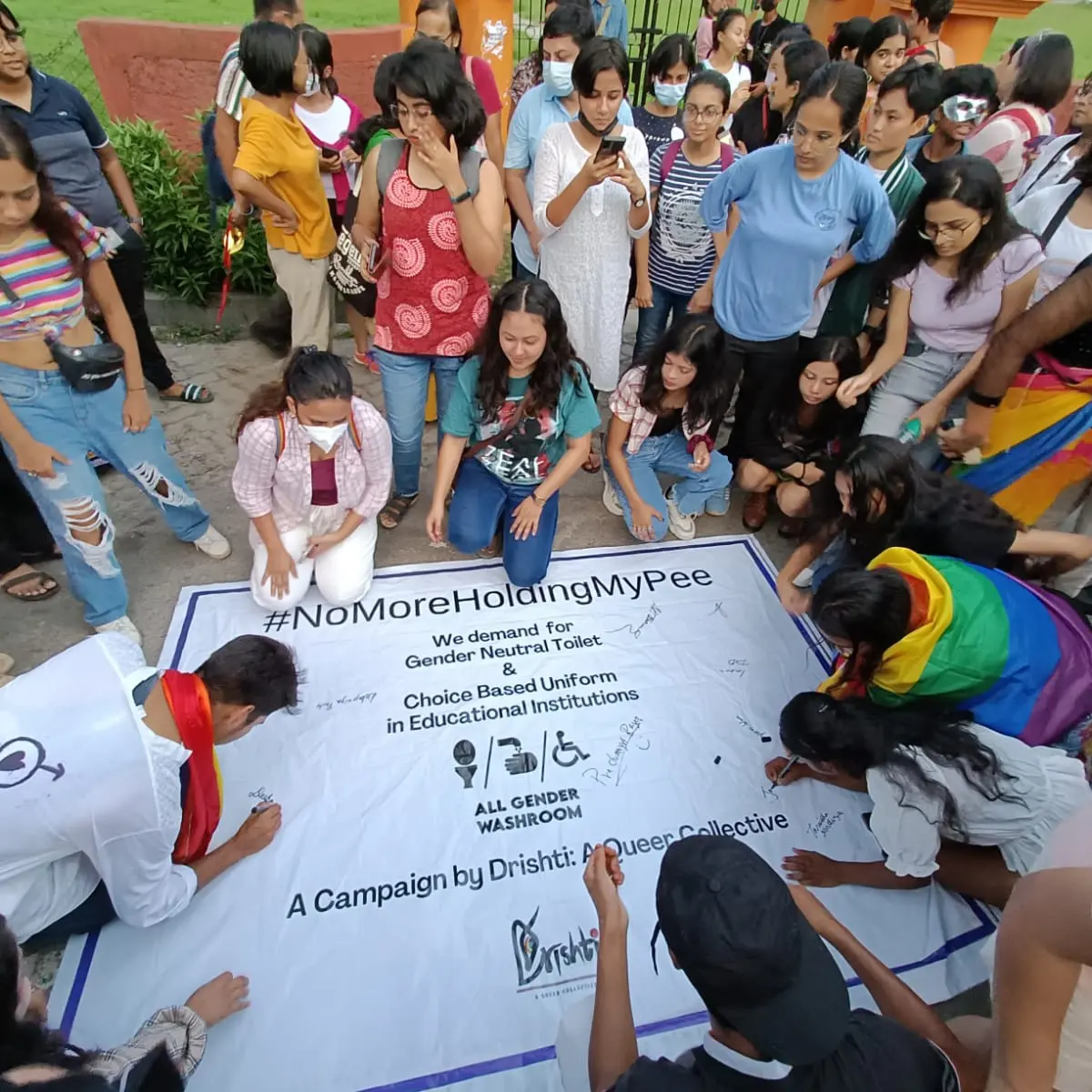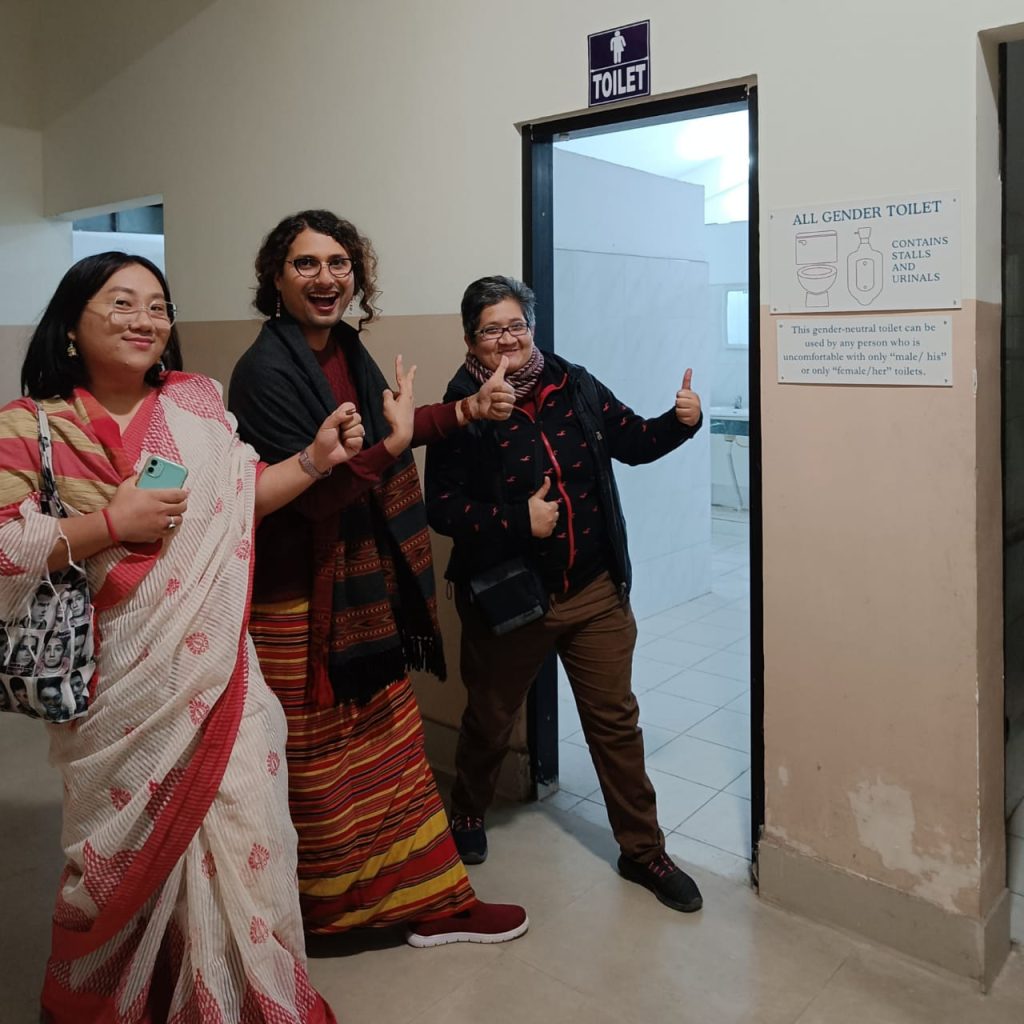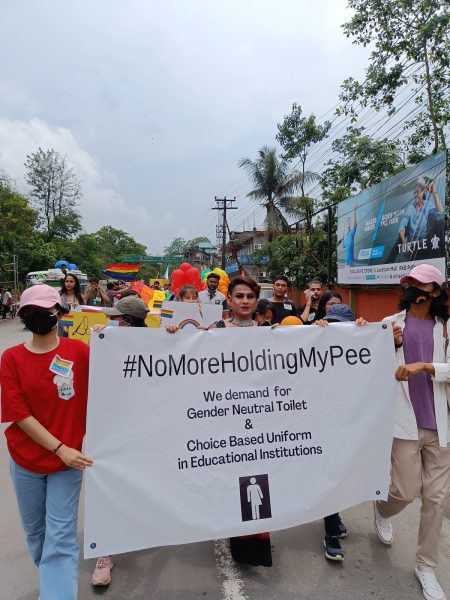
All-gender toilets bring freedom to Assam’s LGBTQIA+ people, unlock doors of acceptance

Growing up in Assam’s Tezpur, Pixie (who goes by their first name only), a non-binary college student, was “often judged and stereotyped” for their identity. “I was always sidelined. There was a lack of acceptance — be it at school, public spaces or social gatherings,” Pixie recalls. A lack of acceptance automatically translated into a lack of accessibility. Small things like moving freely from one place to another or using a public washroom that “normal” teenagers do on a daily basis were often unreachable for Pixie. “It was mostly self-denial to save me from mental agonies,” Pixie tells The Federal.
Those were awkward and uncomfortable days for Pixie as they hardly expressed their “feelings and truth to others.” The 22-year-old, currently pursuing their graduation from Guwahati, around 180 km from their hometown, says, “I am partially closeted.” Pixie’s parents know their “identity” but not their relatives and many acquaintances.
In Guwahati — where Assam’s capital Dispur is located — they are part of a small but thriving LGBTQIA+ community. “I feel a sense of belonging with my community members,” says soft-spoken Pixie with a smile. LGBTQIA+ is an acronym used to signify gay, lesbian, bisexual, transgender, queer, intersex, and asexual people collectively.
Unisex toilets: Things changing for the better
Back in Tezpur, the cultural hub of Assam, things are changing for the better, feels Pixie. Last year in June, Tezpur Central University, one of the finest educational institutions in the northeast region, opened three gender-neutral washrooms. A gender-neutral washroom is an inclusive bathroom that can be used by anyone irrespective of gender or sex.
Also read: Caste bias in IITs: Somnath Waghmare’s docu seeks dignity for Dalit lives
Unisex washrooms/toilets as a concept or a sanitation and hygiene necessity for the queer fraternity are almost non-existent in India. To open up such facilities in a leading educational space in the country’s most neglected region — otherwise seen or heard only when violence hits this part — is a clear message that the LGBTQIA+ community has every right to lead a safe and respectable life openly. It is a big step forward towards inclusivity and goes beyond the socially recognised binary of men and women.
How a campaign started
There is an “inspiring story” behind how the university got the washrooms. The idea germinated during a visit by transgender activist Rituparna (who goes by her first name only) to the campus. Rituparna, who identifies herself as a transgender non-binary person, was a resource person for a workshop organised at the university’s social work department.

Rituparna, who loves wearing sarees, had to change her clothes but the department had toilets only for men and women. “Where do I change my saree?”, Rituparna raised the question to the faculty members. “It was then we decided to open all-gender washrooms. We wanted to make Rituparna and all those who identified themselves as members of the LGBTQIA+ community welcomed into our institution. Thankfully, authorities allowed us to provide inclusive washrooms,” says Namami Sharma, a faculty member at the university’s social work department.
Building alliances, fighting differences
Thus started a campaign to build gender-neutral toilets in Assam’s public spaces (mostly educational institutions). In less than a year, after Tezpur Central University’s big leap, similar washrooms for the queer community were built in colleges like Dispur College, Guwahati, and Jawaharlal Nehru College, Boko in Kamrup district.
Along with forging alliances among members of the community on educational campuses, building gender-inclusive toilets started a conversation on the needs, issues and discrimination faced by the queer community–one of the most marginalised sections of society. The toilets have become a symbol of an existence of non-binary or non-gender conformist individuals who often feel “misgendered”.
Also read: How Kerala activist Rehana Fathima uses her body to battle patriarchy
The initiative is changing the mindsets of people towards the queer community. It’s also helping them become a part of the mainstream, an opinion community members share. Rituparna, founder-director of Akam Foundation, a non-profit organisation, along with members of Drishti — a queer collective — is running the “#NoMoreHoldingMyPee” campaign to make educational spaces gender-neutral across Assam. The campaign aspires to open universal toilets in all educational institutions across the state. The community members want the ruling Bharatiya Janata Party (BJP) government in the state to step in to fulfil their demands.
“Whenever I am away from my home for long hours, I always hold my pee. I avoid using public washrooms built for either men or women. A toilet is a space of utmost discomfort for non-binary or non-gender conformist individuals. We are either being considered as a threat or threatened,” Rituparna says. She says that she is still perceived as a man because of the beard on her face and can’t possibly use female toilets. So she goes to men’s toilets when nobody is around. Since her school days, Rituparna has faced harassment and humiliation because of her identity even while using basic facilities like a toilet.
Along with getting support from a lot of students and faculty members of various educational centres, the initiative of the queer collective also met with resistance. There were episodes of online trolling of “#NoMoreHoldingMyPee” campaign. During the Tezpur Pride Walk in 2022, posters against gender-neutral washrooms were put up around the venue.
“The opposition to the campaign did not deter us. The struggle of the LGBTQIA+ community is a long one. We rely on allies and we have found some amazing friends in our journey. The support from the cis community is also laudable. People like Sunita Agarwal, vice-principal, Dispur College, Guwahati, have provided us immense support,” says Rituparna.
Coming out and the struggles ahead
It was in 2014 when Assam’s LGBTQIA+ community asserted their presence in public by hosting the first Queer Pride Parade in Guwahati. In fact, it was the first such assembly of community members in the entire northeast region. Rights groups don’t know the strength of the community. As per the 2011 census, Assam has around 11,000 transgender people. Thus a “small and invisible” community standing up for basic amenities — toilets — is nothing less than revolutionary. Despite promises made to eliminate open defecation by building toilets in every household across the country under Swachh Bharat Mission launched by Prime Minister Narendra Modi in 2014, ground realities tell a different story.
In India, poverty, caste and gender play a major role in deciding who does and who does not get access to basic services like toilets and clean drinking water. The lack of a safe and clean public toilet is a pet peeve of cis women too. All of them are victims of a patriarchal society as access to goods and services is mostly enjoyed by cis men.
As Rituparna spoke to the members of the community, it came to light that the non-availability of toilets forced many to leave their education midway. “This (providing toilets) will not require a big shift in infrastructure but will require a shift in mindsets for sure. We need to sensitise the staff, faculty, and students in these spaces about gender and sexuality. When people understand the nuances of the entire spectrum of gender and sexuality, they will better understand the predicament queer folks face in using the toilet,” says Rituparna.
“The toilet is incidental. It is about the dignity and acceptance of a community that has been pushed to the background,” she adds.
The young and fearless
Amulya Gautam is only 16 and relentlessly fighting for the safety and acceptance of the LGBTQIA+ community. Gautam, who identifies herself as a binary transwoman, has been instrumental in opening a gender-neutral toilet in her alma mater, South Point School, Guwahati, recently. Gautam tells The Federal that she took help from Rituparna to open the toilet in her school. “I met Rituparna during the inauguration of a clinic for the LGBTQIA+ community in Guwahati. I am a member of Anaajoree, an organisation that works on gender and sexuality rights. With everyone’s help, we conducted an awareness programme in my school and the school authorities agreed to open the toilet,” adds the Class 10 student.

Gautam feels lucky to have a supportive family. She started socially transitioning two years ago. “When I came out, things worsened but I am glad I don’t have to hide anything about my identity now,” she says. In school, “fellow students always bullied and harassed” her for her “femininity”. “After I came out, fellow children in school met me with raised eyebrows. They asked me awkward questions like if I am a boy or a girl. It was dehumanising and it badly affected my mental health,” says Gautam.
Like Pixie, Gautam says her community members helped her to build confidence which she lacked earlier. It is because of her new-found confidence that today Gautam goes to school wearing her “chosen uniform”.
The state of the matter
In March 2022, NALSAR University of Law in Hyderabad, Telangana, opened gender-neutral washrooms. Following suit, the Indian Institute of Technology (IIT) Delhi and Mumbai’s Whistling Woods International — a film, communications and arts school — opened unisex washrooms in January this year. It was the opening of nine universal restrooms inside the Supreme Court complex in New Delhi in April this year that gave a big boost to all who are seeking inclusivity. From Bengaluru (Karnataka), Chennai (Tamil Nadu) to Kolkata (West Bengal), demands to provide gender-neutral toilets in public places have been raised in the past with little success.
Also read: Succession review: A cautionary tale on the state of democracy, and rich-poor divide
Experts say the absence of gender-neutral toilets goes against the 2014 Supreme Court judgement in the National Legal Services Authority vs Union of India case. The court directed the authorities to provide separate public toilets to the LGBTQIA+ community. There are, however, apprehensions among community members that unisex public spaces make them more vulnerable to attacks and harassment as their identities get highlighted.
The rural reality
In Boko, Assam, around 55 km from Guwahati, life moves at a slow pace. The town — a cluster of around 140 villages — is yet to be touched by the fast-paced modern life. The people from the LGBTQIA+ community do stay in these villages but nobody talks about them. They lead a secret life as coming out is not a choice in rural areas for most.
Last year, when Jawaharlal Nehru College, Boko, decided to open a gender-neutral washroom, at least the students of the college started taking an interest in the complexities surrounding gender and sexuality. Tapan Dutta, college principal, tells The Federal that it is the need of the hour. “We organised an event on gender sensitisation. We saw students taking a lot of interest in issues related to the queer community, which was not the case earlier. We decided to build the washroom as a representation of an inclusive space, the services of which can be availed by all irrespective of their gender and sexuality.”
Pixie says those who don’t want to be clubbed under the binary of male or female often suffer from gender dysphoria. “I have eyebrow piercing and short hair, and I wear masculine clothing. People question my choices and my lifestyle. They ask me why I behave like a man when I was born as a female. That is when gender roles come into the picture. They want to put me in a box. People like me are forced to follow the set societal rules and if we don’t, we are called troublemakers.”
In such an atmosphere, having an inclusive space — even if it is a washroom — means a lot for Pixie. “I don’t want anyone to be bullied, teased and molested for their identity,” they add.
(The author is a Laadli Media Fellow, 2023. All the opinions and views expressed are those of the author. Laadli and UNFPA do not necessarily endorse the views.)

